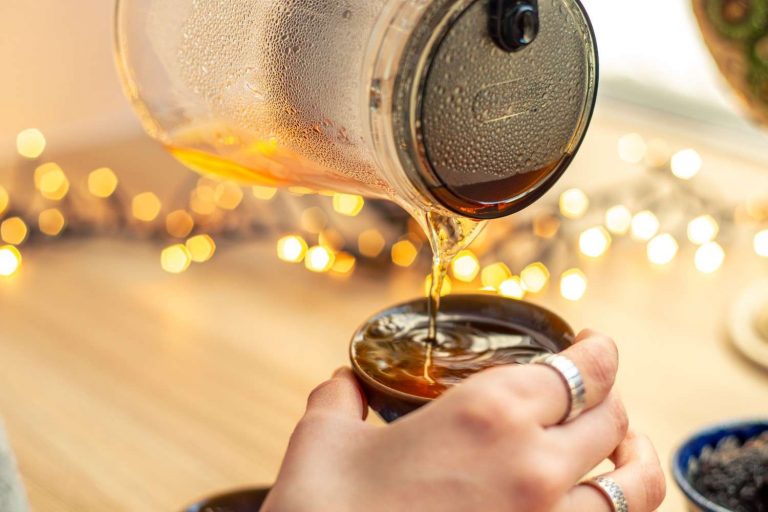7 Ways Brain Focus Tea Boosts Concentration
Brain focus tea is a simple, ritualistic cup that sharpens attention, calms the jitter, and hands you a clean thread to follow through your day. I mean literal tea—blends of leaves, herbs, and targeted compounds made to support cognition without the drama. If you want to get more done with less inner noise, this is a tool you can use every morning and again when the afternoon slump sneaks up.
You should know what it is and why it matters. Brain focus tea usually pairs small amounts of caffeine with calming amino acids like L-theanine, plus botanicals that support circulation and stress resilience. It’s not a substitute for sleep or therapy, but it’s a reliable nudge that helps your brain perform the work you ask it to do.
Think of this as practical beauty for your brain: small acts repeated become the backbone of better days. A good brain focus tea is more than flavor—it’s an ingredient-driven strategy that respects how attention actually works.
Contents
- How Brain Focus Tea Sharpens Your Mind
- 1. Brain Focus Tea Enhances Neurotransmitter Balance
- 2. Brain Focus Tea Reduces Anxiety Without Dulling You
- 3. Brain Focus Tea Improves Blood Flow And Oxygen Delivery
- 4. Brain Focus Tea Supports Memory Encoding
- 5. Brain Focus Tea Helps Regulate the Sleep-Wake Cycle
- 6. Brain Focus Tea Encourages a Productive Ritual
- 7. Brain Focus Tea Lowers Cognitive Fatigue During Long Tasks
- Practical Ways To Use Brain Focus Tea For Maximum Result
- What The Research And Experts Say
- How To Choose A High-Quality Brain Focus Tea
- A Simple 14-Day Experiment For Real Results
- Safety, Side Effects, And When To See A Professional
- Bottom Line
- FAQ
How Brain Focus Tea Sharpens Your Mind
A well-formulated brain focus tea nudges neurotransmitters in the right direction—gentle stimulation balanced with calm. L-theanine promotes relaxed alertness, while modest caffeine improves signal clarity in neural pathways. That combo is why researchers from reputable institutions have seen improved attention and task performance in controlled studies.
You’ll notice the difference as a steadier stream of thought, not a lightning bolt of fake focus. Over weeks, pairing your cup with sensible sleep and hydration makes concentration a habit, not a fluke. Used consistently, brain focus tea becomes the ritual that wires your brain for clearer work sessions.
1. Brain Focus Tea Enhances Neurotransmitter Balance
A thoughtful brain focus tea blend usually brings together L-theanine and light caffeine. L-theanine increases alpha brain waves and supports a calm but alert state, while caffeine sharpens reaction time and vigilance. Together they help your brain’s chemical messaging work with less noise and more signal.
Clinical research shows the L-theanine/caffeine pairing supports improved attention and faster processing. That’s the physiological backbone of better mornings where you actually get into a flow state instead of floundering.
2. Brain Focus Tea Reduces Anxiety Without Dulling You
When stress is high, concentration tanks. A gentle brain focus tea with adaptogens like rhodiola or calming herbs like lemon balm helps modulate stress hormones so you stay engaged. You don’t want to be sedated; you want tension lowered enough that your thoughts can line up in order.
People who sip such blends report fewer distraction loops. Controlled trials indicate certain botanicals can reduce perceived stress—so you keep clarity without losing energy.
3. Brain Focus Tea Improves Blood Flow And Oxygen Delivery
Some teas include herbs such as ginkgo or rosemary that support cerebral circulation. A cup of brain focus tea can aid the tiny blood vessels that keep your neurons fed and oxygenated. Better blood flow means faster recall and longer attention spans.
This isn’t magic. It’s basic physiology: better circulation equals better cognitive function, especially when combined with movement and hydration.
4. Brain Focus Tea Supports Memory Encoding
You want to remember what matters. Ingredients in many blends—like bacopa and green tea catechins—have been studied for memory benefits. A deliberate brain focus tea during learning sessions helps your brain move facts from passive to active memory more efficiently.
Think of the cup as a cognitive amplifier during study, meetings, or practice. It increases retention without making you anxious or wired.
5. Brain Focus Tea Helps Regulate the Sleep-Wake Cycle
Good focus starts with restorative sleep. Timed doses of a low-caffeine brain focus tea in the morning, and caffeine-free variants in the late afternoon, help anchor your circadian rhythm. Rhythms matter: consistent wake-sleep signals make concentration easier.
When your body knows when to be alert and when to rest, you stop using brute force to pay attention.
6. Brain Focus Tea Encourages a Productive Ritual
A lot of focus is behavioral. Brewing a cup becomes a built-in cue: sit down, close distractions, do the thing. A labeled brain focus tea ritual trains your mind to prepare for work. Rituals cut down decision fatigue and make deep work predictable.
Small cues like the smell of herbs or the warmth of a mug prime your brain for work faster than any motivational pep talk.
7. Brain Focus Tea Lowers Cognitive Fatigue During Long Tasks
Sustained attention wears out your cognitive resources. A steady, low-dose brain focus tea supports stamina—enough lift to keep performance steady without the crash. Ingredients that modulate stress and support neurotransmitters delay the point where errors and off-task thoughts creep in.
Used strategically—before long meetings, during study blocks, or mid-project—you’ll find your endurance improves and your productivity becomes less of an uphill battle.
Practical Ways To Use Brain Focus Tea For Maximum Result
Be smart. Match the tea to the task. For heavy creative work, pick blends with a calm edge (higher L-theanine, lower caffeine). For alert, detail-heavy sessions, choose a slightly stronger caffeine presence with supportive botanicals.
Timing matters. Have a cup about 20–45 minutes before your work block so the ingredients peak as you begin. Keep hydration in the mix—tea is not a substitute for plain water. If you’re sensitive to caffeine, choose decaffeinated green tea with L-theanine or caffeine-free herbal blends.
Combine with the basics: sleep, short walking breaks, and a quick breathing reset. Those simple habits amplify the effects of any brain focus tea and protect you from over-relying on stimulants.
What The Research And Experts Say
Clinical studies have shown benefits for attention and cognition from L-theanine combined with caffeine, and reviews published by university researchers link adaptogens and specific botanicals to improved stress resilience and mental performance. If you want readable science, Harvard Health and NIH summaries offer balanced takes on caffeine and herbal support, and peer-reviewed journals include controlled trials on memory and attention.
Clinicians I respect recommend these blends as a low-risk supplement to lifestyle changes. They emphasize moderation, sourcing, and transparency—know what’s in the blend and avoid excessive doses.
How To Choose A High-Quality Brain Focus Tea
Look for transparency on ingredients and dosages. Choose vendors who list milligrams and botanical sources. Avoid doom-laden marketing and anything promising instant miracles. If you take medications or have medical conditions, check with your healthcare provider—some herbs interact with prescriptions.
Buy loose leaf when possible, or single-ingredient sachets from reputable brands. Taste matters; if it’s pleasant you’re more likely to use it consistently. Trust companies that back claims with research or third-party testing.
A Simple 14-Day Experiment For Real Results
Try a two-week test: pick a trusted brain focus tea, commit to one morning cup, and track productivity for 14 days. Note: sleep, water intake, and a 20-minute post-cup work block. Record how long you stay focused and how many meaningful tasks you complete.
You’ll be able to see patterns fast. If you feel calmer and sharper, you’ve found something useful. If not, adjust dose, timing, or ingredients. The point is not obsession—it’s observation.
Safety, Side Effects, And When To See A Professional
Most blends are safe in moderate amounts. Watch for jitteriness, insomnia, or stomach upset—those are signals to cut back. Pregnant or nursing women, people with heart conditions, or those on blood thinners should consult a clinician before trying new botanicals.
Quality control matters. Choose brands with third-party testing to avoid contaminants. If a blend promises dramatic cognitive restoration overnight, it’s probably selling fantasy.
Bottom Line
A deliberate, high-quality brain focus tea is a small, repeatable tool that improves attention, steadies stress, and supports memory—especially when paired with sleep, water, and movement. Think of it like wearing a good bra for your attention: supportive, often invisible, and it changes everything about how your day fits.
Try a mindful 14-day run with a single blend and measure the difference. You’ll either find a reliable ally or learn what doesn’t work for you. Either way, you win.
Stay curious. Keep the cup warm. You’ve got better focus ahead.
FAQ
What Is The Best Time To Drink Brain Focus Tea?
Drink one cup about 20–45 minutes before a focused work block. If you’re caffeine-sensitive, enjoy it earlier in the day and switch to caffeine-free blends later on.
Will Brain Focus Tea Replace Medication Or Therapy?
No. It’s a supportive tool, not a replacement. Use it alongside sleep, hydration, and any professional plans you have. If you have a diagnosed attention disorder or mental health condition, consult your clinician.
Are There Any Side Effects I Should Watch For?
Yes—watch for jitteriness, insomnia, headaches, or stomach upset. If you experience these, lower the dose or try a different blend. People on medications or with health conditions should check with their provider.
How Long Until I See Benefits From Brain Focus Tea?
Some people notice subtle changes the same day. More reliable benefits show after consistent use across one to two weeks, especially when paired with good sleep and hydration.
Below is a quick visual separator and a short note before references.
References
-
The National Institutes of Health provides an overview of L-theanine and its effects on attention and relaxation (https://www.ncbi.nlm.nih.gov/pmc/articles/PMC6713408/).
-
Harvard Health Publishing explains how caffeine affects focus and what amounts are generally safe for adults (https://www.health.harvard.edu/blog/can-caffeine-improve-your-memory-and-thinking-2019041816458).
-
The U.S. National Library of Medicine reviews studies on adaptogens and cognitive function and includes clinical trial summaries (https://pubmed.ncbi.nlm.nih.gov/31618061/).
Get Your FREE Natural Health Guide!
Subscribe now and receive our exclusive ebook packed with natural health tips, practical wellness advice, and easy lifestyle changes, delivered straight to your inbox.




